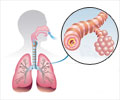A new study conducted by researchers in New Mexico has revealed that cigarette smoking is linked with overproduction of mucus - a symptom of chronic bronchitis.

"Although it is known that chronic mucus secretion is a hallmark of chronic bronchitis, the mechanisms underlying this condition are largely unknown," said Yohannes Tesfaigzi, director of the COPD Program at Lovelace Respiratory Research Institute in Albuquerque.
"This study shows that the airway cells that secrete mucus are sustained by cigarette smoke, which suppresses a cell death-inducing protein called Bik.
"Previous studies have shown overproduction of mucus cells is common in the large and small airways of cigarette smokers.
"This overproduction in the small airways is responsible for airway obstruction and reduced lung function and in the pathogenesis of acute exacerbations of COPD.
"Our previous studies show that following inflammatory responses, up to 30 percent of cells lining the airways undergo death and return to the original cell numbers," he continued. "This cell death is aided in part by proteins, including Bik. Disruption of this recovery process may lead to persistent elevation of mucus cell numbers and contribute to airway obstruction found in chronic lung diseases such as chronic bronchitis.
Advertisement
To test their hypothesis, the researchers examined both human airway tissue samples and mouse models. Human samples were derived from autopsy tissues and from bronchial brushings taken from individuals with chronic bronchitis as well as healthy controls. Chronic bronchitis was defined as a daily cough with phlegm production for 3 consecutive months, 2 years in a row.
The researchers determined Bik was significantly reduced in bronchial brushings of patients with chronic bronchitis compared to non-diseased controls. Examination of autopsy tissues confirmed the finding. Mice exposed to cigarette smoking also had significantly reduced Bik levels and increased numbers of mucus-producing cells.
In another arm of the study, mice exposed to cigarette smoke were subsequently exposed to filtered air for 60 days and evaluated for Bik levels to determine whether Bik remains suppressed even after cessation of cigarette smoking.
They found mice exposed to cigarette smoke still exhibited significantly lower levels of Bik, even after being exposed to filtered air.
"We found that cigarette smoke suppresses Bik levels in humans and in mice models, and mucus cells increased threefold in mice exposed to cigarette smoke," he said.
The findings were published online ahead of the print edition of the American Thoracic Society's American Journal of Respiratory and Critical Care Medicine.
Source-ANI















